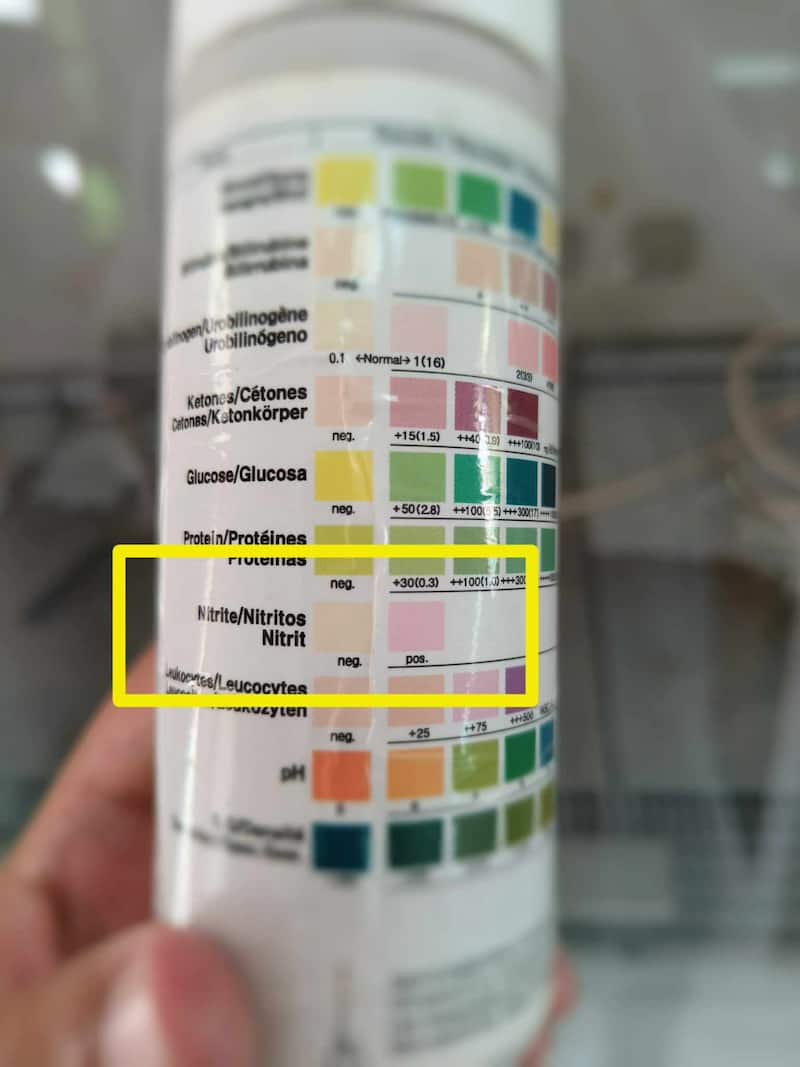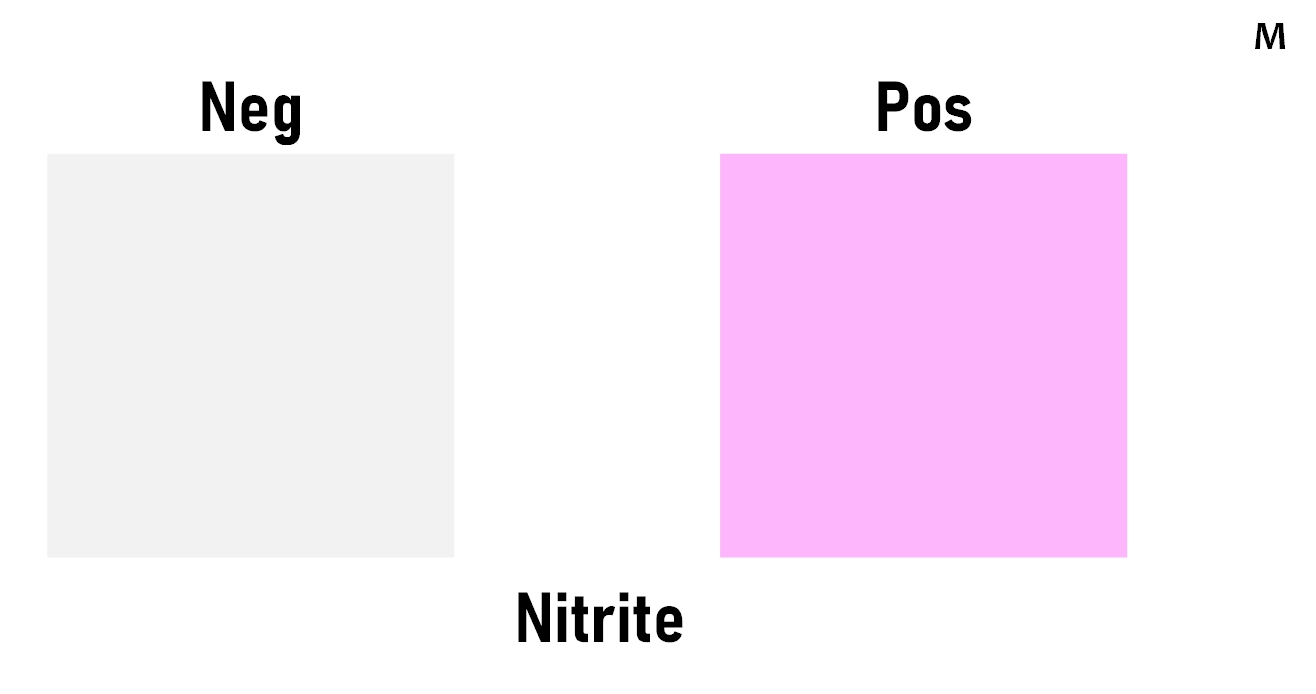Content
Nitrites in urine is a commonly used indicator to detect urinary tract infection. In this article, we will explore the possible causes, symptoms, and how to detect nitrites in urine.
◉ Having nitrites in the urine
Nitrite is not normally present in urine. Their presence, called nitrituria, most often means there is a bacterial infection in the urinary tract.
When there is a bacterial infection in the urinary tract, certain bacteria, especially gram-negative bacteria, have the ability to convert nitrates present in the urine into nitrites.
Testing for nitrites in urine is commonly done using test strips. These strips are easy to use, inexpensive, and can be done at home or in a medical setting.
It is important to note that the nitrite test is not sufficient to make a definitive diagnosis of a urinary tract infection. It should be interpreted in conjunction with other tests and your clinical symptoms.

Urinary nitrite test by dipstick
◉ Nitrite-Positive Urine
Urinary tract infections are one of the most common causes of high levels of nitrite in the urine.
- When a bacterial infection affects the urinary tract, bacteria can colonize the urethra, bladder, or other parts of the urinary system. These bacteria have the ability to produce an enzyme called reductase which converts nitrates to nitrites.
- Foods naturally rich in nitrates, such as leafy green vegetables (spinach, lettuce, etc.) and root vegetables (beets, carrots, etc.), contain nitrates. When you eat these foods, your body metabolizes nitrates and eliminates them through urine.
- Certain medications (nitrofurantoin and phenazopyridine) and procedures (bladder catheterizations) can cause nitrites to be present in the urine, even in the absence of a urinary tract infection.

It's important to interpret a positive nitrite test result alongside other tests, symptoms, and clinical context to confirm and appropriately manage the condition.
◉ Symptoms
Your doctor may order a test for nitrite in the urine when you have symptoms suggestive of a urinary tract infection. These symptoms may include:
- Pain or burning on urination.
- Frequent urination.
- Cloudy, foul-smelling urine.
- Pain in the lower back.
- blood in urine.
- Urinary incontinence.
Your doctor may also order a test for nitrites in the following situations:
- Pregnancy: to monitor for possible bacterial colonization (presence of bacteria without clinical symptoms)
- Before urinary tract surgery or urethral catheterization.
- Monitor people with diabetes or chronic kidney disease.
- As part of a routine examination.
◉ How to detect nitrites in urine by dipstick?
Reagent strips for the detection of nitrites contain specific chemical reagents that react with the nitrites present in the urine.
There are two options for testing nitrites in urine using a dipstick:
- Specialized strips designed to detect only nitrites and leukocytes (leukocyte esterase)
- Multi-parameter strips that test a range of parameters (10-14 tests) to provide a comprehensive assessment of urine composition.
Procedure
- Wash your hands thoroughly and then your genital area with soap and water.
- Start urinating into the toilet, then stop and place the sterile collection container under your urine stream.
- Collect at least 30 milliliters of urine in the container, then finish urinating in the toilet. Remove one strip from its packaging.
- Soak the strip in the urine sample for the recommended time (usually a few seconds).
- Remove the test strip from the urine and tap it gently to remove excess urine.
- Wait the recommended time (60sec) for the test results to develop.
1. Result
A urinary nitrite test is read by comparing the color of the test strip to a color chart provided by the manufacturer.
Any shade of pink on the reagent pad, the test is considered positive.
A negative result is not 100% reliable. Some bacteria may not have the ability to convert nitrates to nitrites, and therefore nitrites may not be detected even in the presence of an infection.

◉ Test limits
Nitrite test, like many other lab tests, isn't without limitations. It can yield false-positive or false-negative results.
False-positive results in a nitrite test
- Certain foods or medications can interfere with the test, leading to false positives.
- Contamination during sample collection.
- If the strips are left in the open air.
False-negative results in a nitrite test
- Not all bacteria responsible for UTIs produce nitrites (enterococcus, staphylococcus or pseudomonas).
- If the urine is not held in the bladder for long enough.
- pH less than 6.
- Vitamin C.
- High urinary specific gravity.
- Low nitrate diet
◉ Complementary tests
When nitrites are detected in the urine, the doctor can request additional tests to better understand the cause:
- Complete urine analysis: To evaluate other parameters such as: leukocyturia, hematuria, proteinuria, glucose, urinary pH, specific gravity, etc.
- Urine culture: Involves culturing a urine sample on a culture medium to determine the presence of bacteria and perform an Antimicrobial Susceptibility Testing (AST).
- Imaging: To detect other structural abnormalities or complications related to infection.
◉ How to reduce urinary nitrates
Treatment for the presence of nitrites in the urine depends on the cause
If the presence of nitrites in the urine is associated with a urinary tract infection confirmed by clinical symptoms and complementary tests, an appropriate antibiotic treatment is generally prescribed to eliminate the infection.
When you drink enough water, your urine becomes less concentrated, which can help reduce nitrate levels through dilution.
◉ Conclusion
Nitrites in urine are important indicators of the possible presence of a urinary tract infection. Although the test is widely used to diagnose UTIs, it has limitations requiring careful interpretation.